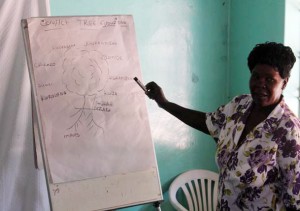Traditional leaders who are part of the membership of Community Peace Clubs which were formed by communities working with Heal Zimbabwe have pledged to uphold peace in their communities. This came out during preparatory reference group training meetings for peace clubs carried out by Heal Zimbabwe from the 2nd – 6th of February 2016 in Manicaland and Masvingo Province. The trainings specifically targeted the two provinces as areas susceptible to human rights violations.
The trainings involved use of different models of peace building such as the conflict tree, which is a model that highlights the root causes of conflicts and their effects on peaceful coexistence in local communities. During the trainings, peace club members were able to demonstrate their understanding of the different conflicts in their areas by using the conflict tree to identify potential conflicts which might degenerate into violence if left unaddressed. They further discussed strategies to use in order to avoid open violence like use of mediation and dialogues techniques. Peace club members were also trained on Stakeholder mapping and analysis, which allows peace clubs to map and identify stakeholders to engage in resolving conflicts and disputes. Heal Zimbabwe Peace clubs are inclusive in nature and they involve ordinary villagers, Traditional leaders such as Chiefs, Village heads and other key stakeholders in communities such as Councillors.
The trainings in Masvingo Province saw a total of 152 peace club members being trained in Zaka and Gutu respectively. The peace clubs trainings in Gutu targeted Ward 6, 5, 2, and 41 with a composition of 20 members per each club. Village Heads Chiwawa, Zemudzo, Mutamba, Matoto and Chief Chiriga who are part of these peace clubs, welcomed the training as it equipped and complemented peace building initiatives that they were already carrying out. In his welcome remarks, Chief Chiriga hailed the work being done by Peace clubs in his area. Here in Gutu, we have managed to discuss openly with everyone on issues that strengthen peaceful co-existence in our locality through Peace clubs, we promise to continue upholding peace in our communitiesâ€, he said.
In Zaka, the training was attended by Chief Bota’s wife Mrs Eunice Bota who leads a Peace club from Ward 24, Village head Chunhuru and other peace club members from wards 18,13 and 24. In her remarks, Mrs Bota highlighted that since they formed peace clubs in their community, people have managed to build mutual trust and respect among each other.â€In our area, people now relate and work together well despite social or political differences…. I strongly urge peace club members gathered here to continue spreading the message of peace as it brings developmentâ€, she said.
 In Manicaland, a total of 226 peace club members were trained in Headlands, Penhalonga and Hauna. The training in Headlands was carried out at Chiwetu Training centre with peace club members from Wards 16,15 and 25. The training had Councillor Timothy Chigwende attending since he is a member of a peace club. Village head Madechiwe hailed the work that peace clubs in the same wards have carried out in resolving disputes and bringing diverse people together given the violent past that characterised Headlands constituency particularly during the 2008 elections “…Our peace clubs have managed to have a wide reaching membership which has seen Councillors and Traditional leaders opting to join peace clubs as they help to build community peace..â€, he said
 The other training within Headlands constituency took place in Tandi ward 12 at Chatindo Creche. Ephraim Chingosho, son to Hon Christopher Chingosho, the Member of Parliament for Headlands constituency, also attended the training. In his remarks he thanked Heal Zimbabwe for working with communities to build peace in his father’s constituency. “…This is a good initiative from Heal Zimbabwe, on behalf of my father, I would like to thank you for encouraging communities to build peace as peace encourages community development’, he said. Headman Nemaire from ward 12, who is part of a peace club from ward 12, also hailed the training and advised that it had come at the right time”…We had longed for this training as it set the ground work for further peace building engagements and assist us to continue with our peace building initiatives”, he said.
In Hauna, Village Heads Chigweshe, Muparutsa and Gwarimbo attended the peace club training which brought together ward 4, 5 and 31. Of interest, the peace clubs in these wards have managed to mediate other disputes that are not politically related ranging from social to economic. This has thus earned them respect and acknowledgement from Traditional leaders who have also joined the peace clubs.”…Peace clubs in my area have managed to bring peace and good social relationships, that is why I became a member’, said Village head Gwarimbo. After the trainings, Traditional leaders and peace club members made peace pledges to uphold peace in their areas.
The peace club trainings are part of Heal Zimbabwe’s capacity building exercise for peace clubs meant to strengthen the work of peace clubs in conflict mediation, violence prevention and community peace. They are also part of Heal Zimbabwe initiatives of promoting community tolerance, healing and cohesion in local communities. The month of February will see Heal Zimbabwe carrying out similar trainings in Gokwe, Muzarabani, Buhera, Chipinge, Murehwa, Mutoko, Mbire, Mazowe, Bikita and Tsholotsho.
About Peace clubs
Peace clubs are ward based platforms that brings people from diverse backgrounds together where they constantly meet and dialogue on conflict management, prevention and transformation. Their role is to mobilize communities for peace activities which include collaborative neutral platforms where people from diverse backgrounds are united by one goal in the community. This allows for the creation of a neutral platform for communities to engage on issues affecting their areas. The composition of peace club include members from different political parties, Councillors, Traditional leaders, Opinion leaders and other key stakeholders at community level.
Post published in: Featured


